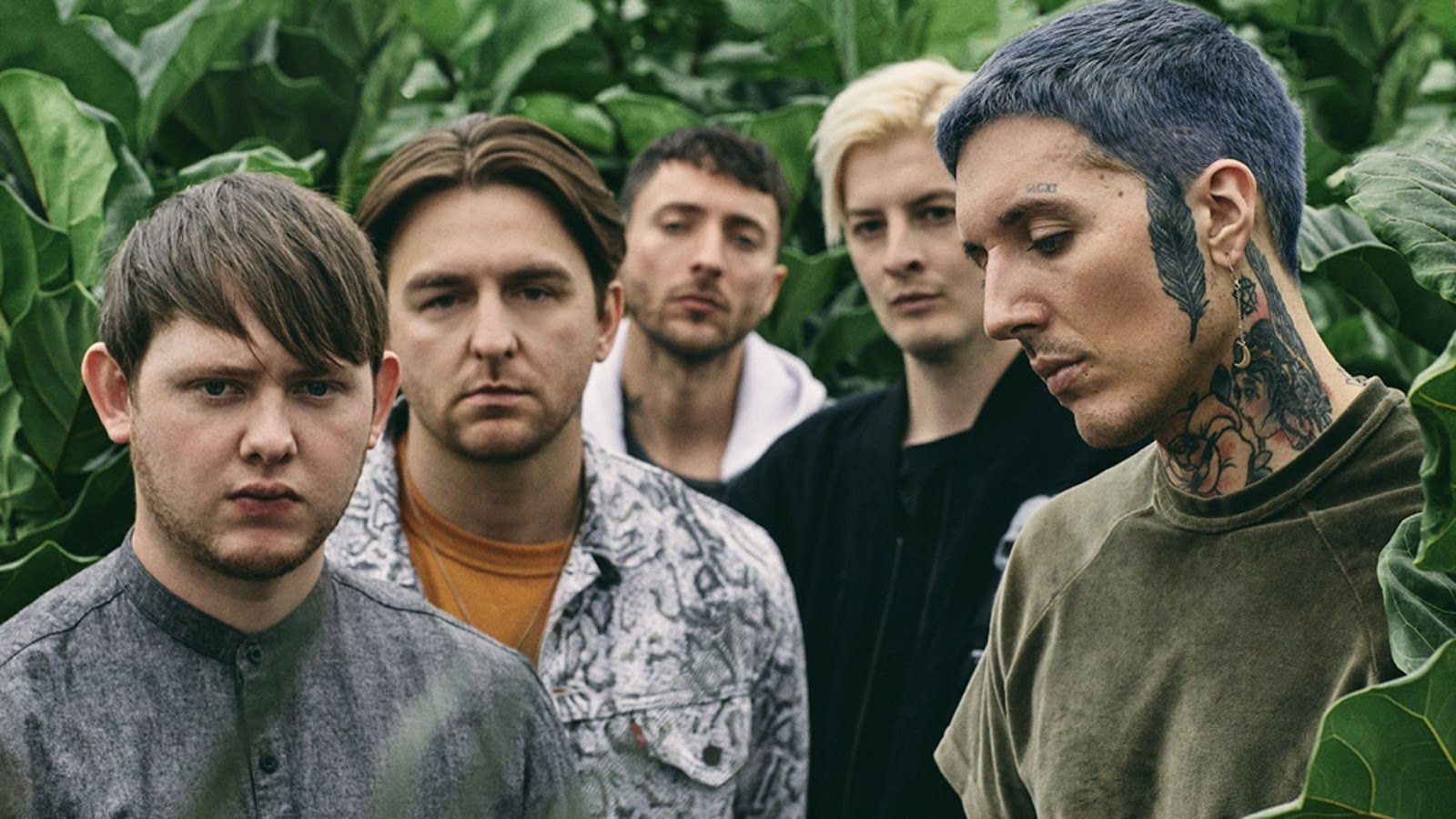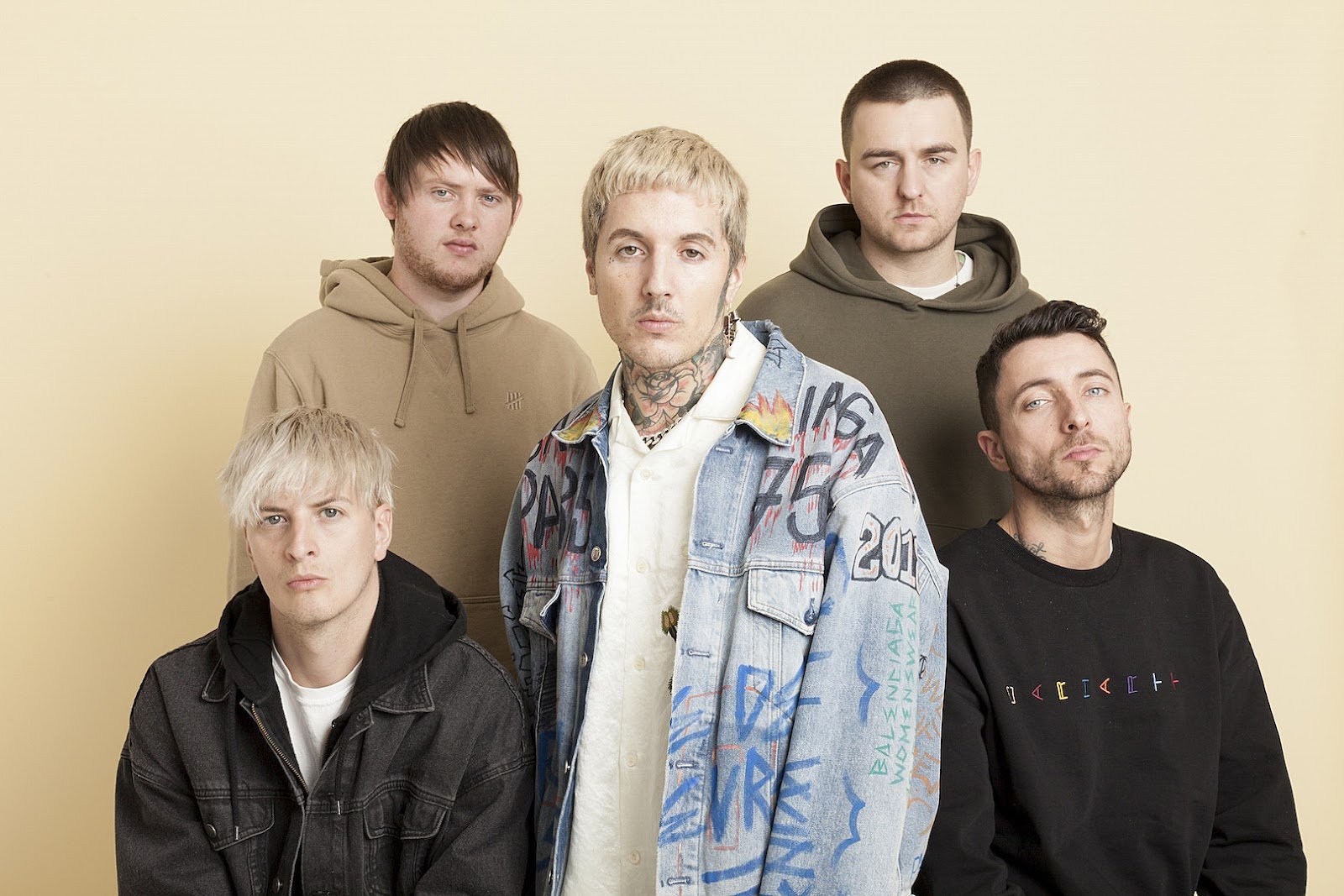Bring Me The Horizon: One Band’s Journey from Metalcore to Electro-Rock
Through years of experimentation, metalcore band Bring Me The Horizon proved that emo wasn’t just a phase. The group took influences from popular music to blend screamo with electronic music to create their signature electro-rock sound.
Written By Olivia Abercrombie
Photo courtesy of Jonathan Weiner
Known exclusively in households as "turn that damn noise off," Bring Me The Horizon was a staple of the UK-based metalcore movement for eight years after rising to fame in the emo era of the 2000s. Built on thick eyeliner, black ripped jeans, and band tees, the subculture’s surge in popularity was the perfect storm of dark punk revival and moody alternative rock that allowed Bring Me The Horizon to thrive.
However, after six years of success in the emo subgenre, the band shifted into a sound with more electronic and pop influences. This was a bold decision for the band because the drastic change could alienate fans of their screamo phase. Moreover, with the reputation Bring Me The Horizon had as an emo group, diving into mainstream music would be difficult.
The band formed in Sheffield, England in 2004, just as the emo movement was coming to fruition. Debut album Count Your Blessings was a deathcore, immature jumble. The band's desperate attempt to find their place in the whirlwind of emo culture seeped into the album, making it almost comical and reminiscent of angsty, hormonal teenage boys. Through the creation of social media platforms like MySpace and Facebook, the musical subculture was thrown into the mainstream because people were able to connect and bond over the internet. The abundance of emo social media stars made the fashion and music of the movement less stigmatized, so the culture grew exponentially. The most popular track of Count Your Blessings, “Pray for Plagues,” showcases the emo aesthetic and its out of control, beserk composition, and edgy lyricism. Lead singer Oliver Sykes screeches, "she starts her new diet of liquor and dick," over a chaotic mass of fast paced drum snares and heavy electric guitar breakdowns.
Bring Me the Horizon’s second album, Suicide Season, introduced the band's metalcore sound. “Back then when we wrote (Count Your Blessings), we were all into [deathcore] but we have (gotten) older and grown up a bit,” said guitarist Lee Malia in an interview. They kept the original shrieking vocals from the first album but added more refined, coherent screaming and EDM-inspired production, introducing their new sound. The instruments on this album were less chaotic and more purposeful in the blending of the guitars, drums, and vocals from Sykes. Lyrically, the band moved on from the forced edginess of Count Your Blessings, diving into heavier, more introspective lyricism. This is especially seen in the the album’s title track, which begins with a grand guitar solo and flows into the repetitive but thoughtful lyrics “if only sorrow could build a staircase / our tears would show the way / we would climb our way to heaven and bring him home again,” discussing grief and its hold on a person. Bring Me The Horizon focused on sonic brutality to let heavy riffs breathe and take on a life of their own by letting them separate from the drums instead of being a jumble of sounds like on Count Your Blessings. Through this transition phase, the band’s fanbase stuck with them since it was a change for the better. This transition won over critics that had not enjoyed the band’s deathcore phase, as this album showed a new level of maturity from the band.
Photo courtesy of Justin Borucki
Bring Me The Horizon continued to explore a new side of this electronic-inspired sound with third album There is a Hell Believe Me I’ve Seen It. There Is A Heaven Let’s Keep It A Secret. A highly conceptual record, it emphasized clean vocals and a clear story about a man struggling with his inner turmoil that “explores humanity's collective good nature.” The band’s sound matured with their, and its members stepped outside of their metalcore comfort zone to transition into heavier experimentation with electronic, classical, and pop influences. Some highlights included violins in song introductions, choral sections in “It Never Ends,” clean vocals from guest artist Lights in “Don’t Go” and “Crucify Me,” and electronic ambient sounds in slowed-down interlude “Memorial.”
Thematically, the album presented an innovative concept, blending religious themes with a genre that is traditionally viewed as satanic. The album’s lyrics specifically portrayed this aesthetic: for example, “Crucify Me” begins with the line “Crucify me and nail my hands to a wooden cross,” which is a not-so-hidden reference to Jesus’ crucifixion, as the song title suggests. Other instances of this theme appear in “It Never Ends” (“We are the children that fell from grace”) and “Don’t Go” (“I was raised in the valley, there were shadows and death). Another strong emphasis in this album was heavy, dark lyricism. In “Home Sweet Hole,” dives deep into the album’s main theme of inner turmoil: “’Cause I'm staring at the devil and the truth of it is / He's a lot more familiar than I'd care to admit.” The album was met with critical and fan acclaim alike, topping Rock Sound’s top 75 albums of 2010.
Bring Me the Horizon exploded in popularity in 2013 with its fourth studio album, Sempiternal. The band members continued to lean into an electronic sound, using synthesizers and electronically produced beats to songs with their signature heavy guitar breakdowns and Sykes’ unique scream. The band’s most popular song to date,“Can You Feel My Heart,” uses synthesizers that reflect the haunting feel that is also present in the lyrical content and Syke's pain-stricken screams in songs like “Sleepwalking” and “Hospital for Souls.” However, as the album name suggests, this feeling is a timeless, everlasting one. The album is both thematically and sonically complex, exploring concepts of self-reflection and facing internal struggle head on. The former is exemplified in the bridge of “Can You Feel My Heart,” where Sykes chants:
“I'm scared to get close and I hate being alone
I long for that feeling to not feel at all
The higher I get, the lower I'll sink
I can't drown my demons, they know how to swim”
The ominous “Shadow Moses” also deals with internal struggle: “I thought I'd cut you loose, severed the feeling / I slipped through the cracks and you caved in my ceiling / I thought I'd buried you, what's dead can never die.” The band also combined its classic metalcore sound with an even more diverse range of musical influences, citing Danny Boyle’s film soundtracks from The Beach and 28 Days Later as sources of inspiration. Sykes's struggles with addiction bleed through in the desperation of songs like “Hospital for Souls” which discusses rehab (“The fragile, the broken / sit in circles and stay unspoken / we are powerless”) and Sleepwalking which focuses on the inner turmoil of addiction (“My skin's smothering me”).
The band got recognition in the alternative music realm with Sempiternal, winning Album of the Year at the 2014 Alternative Press Music Awards. During his acceptance speech at the award show, Skyes opened up about the experience: "I was addicted to a drug called ketamine; I was on it for years, and I was f--ked off my head (...) everyone wanted to kill me (...) but they didn't. They stood by me, they supported me through all of that s--t, and we wrote Sempiternal because of it." Retrospectively, Sykes's heavy and dark lyricism can be attributed to his experience with mental health and drug abuse.
Photo courtesy of Connor Morris
The most significant transition phase for the band, however, was its wildly successful That's the Spirit. The record showcased electro-rock and pop sounds through heavily produced synth beats and clean vocals. According to Sykes, this transition occurred because after getting out of rehab, he "didn't want to f--king scream anymore, [he] wanted to sing (...) from the f--king rooftops." This major shift in his life and the band’s maturity as a whole made this dive into the mainstream possible. "We squeezed metal for all it’s worth, and if we were going to write another album like Sempiternal, we’d just be treading old ground," Sykes shared in an interview with Loud Wire. The experimentation Bring Me the The Horizon has done has made them a sort of gateway band for people to discover rock music and then slowly become introduced to metal through the band’s earlier work. That’s the Spirit debuted at number two in the UK and the Billboard Top 200 in the U.S., marking the band’s new era of less aggressive rock and dip into mainstream music.
All the years of experimentation didn't end here, however. In 2019, the band released two albums, amo and Music to listen to~dance to~blaze to~pray to~feed to~sleep to~talk to~grind…. The two albums cut the aggression out of the band’s sound, opting for a softer, electro-rock feel. While tracks like “Underground Big” from Music to listen to... and “MANTRA” from amo leaned into the group’s original heavier metal sound, these albums were an experimental fusion of all the music the band has explored to date, from rock to pop to electronic.
The culmination of all this musical discovery came to a head with Post Human: Survival Horror, which is the perfect blend of the band’s aggressive past, softer present, and electro-core future. With nine solid tracks fusing metalcore with electronic and even featuring kawaii metal from BABYMETAL, this album encapsulates the music journey that Bring Me The Horizon’s members embarked on to discover a sound that is uniquely theirs. Their latest release, the single “DiE4u,” continues to push the boundaries of what mainstream metal can sound like. Sykes mixes clean vocals with his classic scream over an electropop beat, which does an impressive job of combining all the genres the band explored in their past albums, while giving a glimpse of what the future looks like for Bring Me The Horizon.
Photo courtsey Joe Dick
Growing from the grimy basement shows of their death-core days, the band has become a critically recognized powerhouse of metal experimentation that has garnered adoration from all corners of the music industry. Recently, Bring Me The Horizon scored a feature with Olivia O'Brien and even drew attention from the TikTok community with its song “Can You Feel My Heart,” which is used in a trend where creators reenact a tense movie scene where a character falls off a building as the chorus of the song plays. The future of Bring Me The Horizon is as exciting and unpredictable as when the band members were just young teens starting out, and they will continue to craft their unique sound with each new release.




